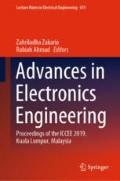Abstract
This paper presents an In-Memory Computation (IMC) architecture using Full Swing Gate Diffusion Input (FS-GDI) in a single-ended disturb-free 6T SRAM. Not only are basic boolean functions (AND, NAND, OR, NOR, XOR2, XOR3, XNOR2) fully realized, a Ripple-Carry Adder (RCA) is also realized such that IMC is feasible without ALU (Arithmetic Logic Unit) or CPU. FS-GDI reserves the benefits of the original GDI, and further resolves the reduced voltage swing issue, but it leads to speed degradation and large static power. Therefore, by using in-memory computing technique, the well-known von-Neumann bottleneck will be mitigated as well as energy efficiency is enhanced.
Access this chapter
Tax calculation will be finalised at checkout
Purchases are for personal use only
References
Backus J (1978) Can programming be liberated from the von Neumann style? A functional style and its algebra of programs. Commun ACM 21:613–641. https://doi.org/10.1145/359576.359579
Wang Y, Yu H, Ni L, Huang G, Yan M, Weng C, Yang W, Zhao J (2015) An energy-efficient nonvolatile in-memory computing architecture for extreme learning machine by domain-wall nanowire devices. IEEE Trans Nanotechnol 14(6):998–1012. https://doi.org/10.1109/TNANO.2015.2447531
Jain S, Ranjan A, Roy K, Raghunathan A (2018) Computing in memory with spin-transfer torque magnetic RAM. IEEE Trans Very Large Scale Integr VLSI Syst 26(3):470–483. https://doi.org/10.1109/tvlsi.2017.2776954
Jeloka S, Akesh NB, Sylvester D, Blaauw D (2016) A 28 nm configurable memory (TCAM/BCAM/SRAM) using push-rule 6T bit cell enabling logic-in-memory. IEEE J Solid-State Circ 51(4):1009–1021. https://doi.org/10.1109/JSSC.2016.2515510
Fan D, Angizi S (2017) Energy efficient in-memory binary deep neural network accelerator with dual-mode SOT-MRAM. In: IEEE international conference on computer design (ICCD). IEEE Press, Boston, pp 609–612. https://doi.org/10.1109/iccd.2017.107
Wang C-C, Tseng Y-L, Leo H-Y, Hu R (2004) A 4-Kb 500-MHz 4-T CMOS SRAM using low-VTHN bitline drivers and high-VTHP latches. IEEE Trans Very Large Scale Integr VLSI Syst 12(9):901–909. https://doi.org/10.1109/tvlsi.2004.833669
Wang C-C, Lee C-L, Lin W-J (2007) A 4-Kb low power SRAM design with negative word-line scheme. IEEE Trans Circ Syst I Regul Pap 54(5):1069–1076. https://doi.org/10.1109/tcsi.2006.888767
Wang C-C, Hsieh C-L (2016) Disturb-free 5T loadless SRAM cell design with multi-vth transistors using 28 nm CMOS process. In: IEEE international SoC design conference (ISOCC). IEEE Press, Jeju, pp 103–104. https://doi.org/10.1109/isocc.2016.7799754
Morgenshtein A, Fish A, Wagner IA (2002) Gate-diffusion input (GDI): a power-efficient method for digital combinatorial circuits. IEEE Trans Very Large Scale Integr VLSI Syst 10(5):566–581. https://doi.org/10.1109/tvlsi.2002.801578
Ahmed MA, Abdelghany MA (2018) Low power 4-bit arithmetic logic unit using full-swing GDI technique. In: International conference on innovative trends in computer engineering (ITCE). IEEE Press, Aswan, pp 193–196. https://doi.org/10.1109/itce.2018.8316623
Dong Q, Jeloka S, Saligane M, Kim Y, Kawaminami M, Harada A, Miyoshi S, Yasuda M, Blaauw D, Sylvester D (2018) A 4 + 2T SRAM for searching and in-memory computing with 0.3-V VDDmin. IEEE J Solid-State Circ 53(4):1006–1015. https://doi.org/10.1109/jssc.2017.2776309
Agrawal A, Jaiswal A, Lee C, Roy K (2018) X-SRAM: enabling in-memory boolean computations in CMOS static random access memories. IEEE Trans Circ Syst I Regul Pap 65(12):1–14. https://doi.org/10.1109/tcsi.2018.2848999
Acknowledgements
The investigation was partially supported by Ministry of Science and Technology (MOST), Taiwan, under grant MOST 107-2218-E-110-004- and MOST-107-2218-E-110-016-. The authors would like to express their deepest gratefulness to CIC (Chip Implementation Center) in NARL (Nation Applied Research Laboratories), Taiwan, for the assistance of thoughtful chip fabrication.
Author information
Authors and Affiliations
Corresponding author
Editor information
Editors and Affiliations
Rights and permissions
Copyright information
© 2020 Springer Nature Singapore Pte Ltd.
About this paper
Cite this paper
Wang, CC., Sulistiyanto, N., Tsai, TY., Chen, YH. (2020). Multifunctional In-Memory Computation Architecture Using Single-Ended Disturb-Free 6T SRAM. In: Zakaria, Z., Ahmad, R. (eds) Advances in Electronics Engineering. Lecture Notes in Electrical Engineering, vol 619. Springer, Singapore. https://doi.org/10.1007/978-981-15-1289-6_5
Download citation
DOI: https://doi.org/10.1007/978-981-15-1289-6_5
Published:
Publisher Name: Springer, Singapore
Print ISBN: 978-981-15-1288-9
Online ISBN: 978-981-15-1289-6
eBook Packages: EngineeringEngineering (R0)

